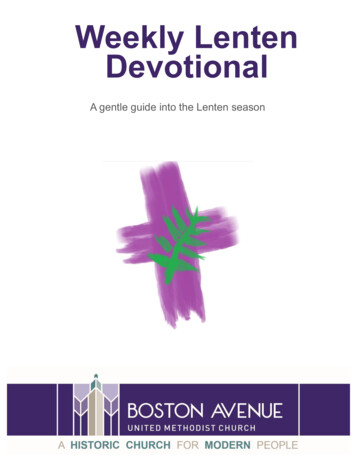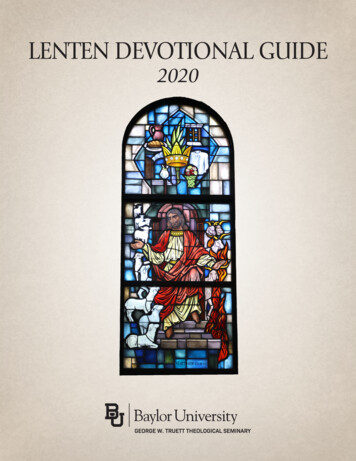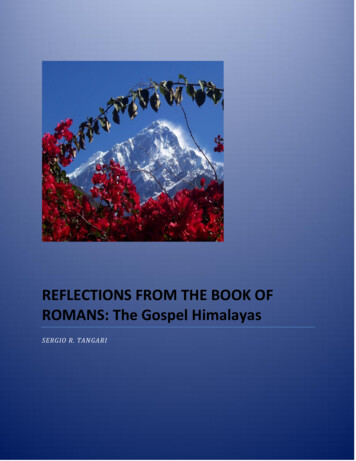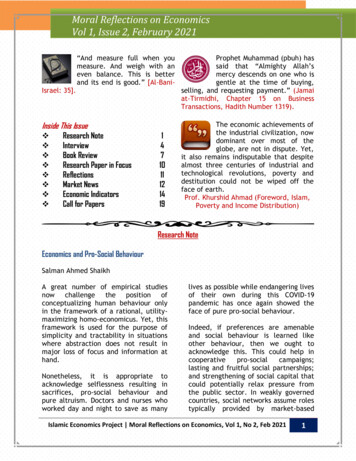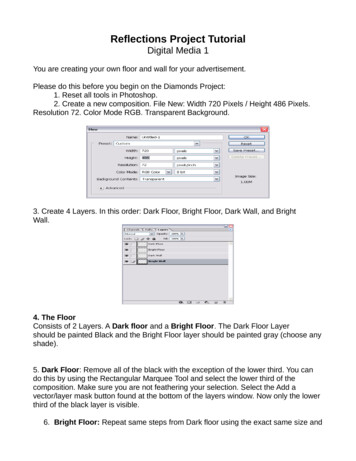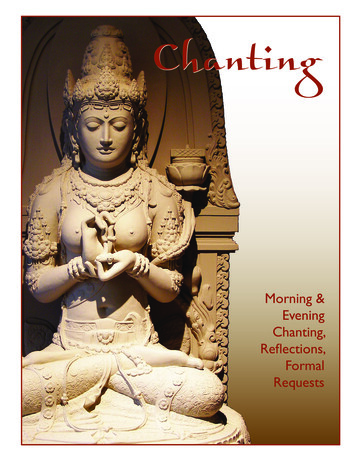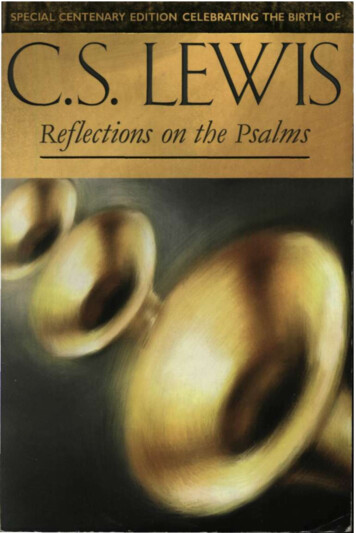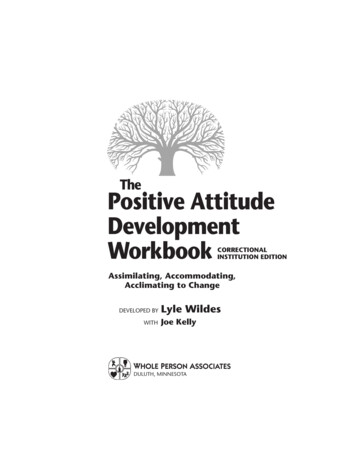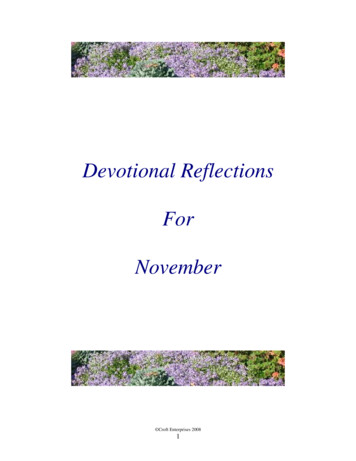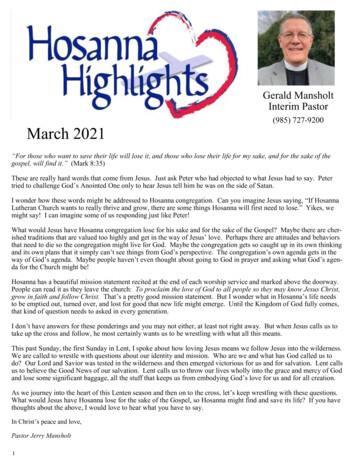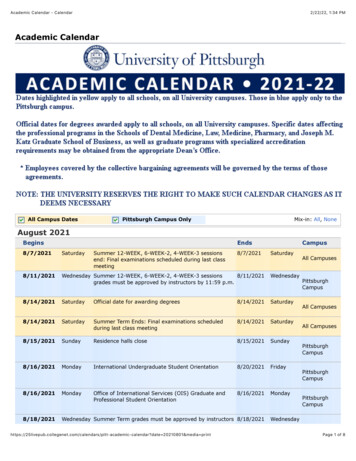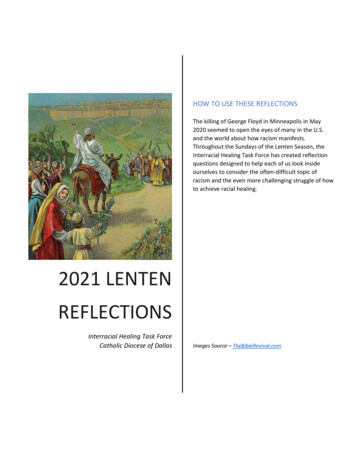
Transcription
HOW TO USE THESE REFLECTIONSThe killing of George Floyd in Minneapolis in May2020 seemed to open the eyes of many in the U.S.and the world about how racism manifests.Throughout the Sundays of the Lenten Season, theInterracial Healing Task Force has created reflectionquestions designed to help each of us look insideourselves to consider the often-difficult topic ofracism and the even more challenging struggle of howto achieve racial healing.2021 LENTENREFLECTIONSInterracial Healing Task ForceCatholic Diocese of DallasImages Source – TheBibleRevival.com
Diocese of DallasDiocesan Interracial Healing Task ForceLenten Reflections - 2021Opening Prayer: Lord of all, we pray for healing to address the persistent sin of injustice, whichis the rejection of the full humanity of some of your children, and the talents and potential youhave given them. We pray for the grace to recognize the systems that do not support thedignity of every person, that do not promote respect for those who are different thanourselves, who bear the legacy of centuries of discrimination, fear, and violence. Give us eyes tosee how the past has shaped the complex present.We pray for social structures in which children of color can grow up without fear, in securityand dignity, with access to health care and a quality education that will allow them to developtheir gifts.Empower us to create a new way forward, with a new sense of community that embraces andcelebrates the rich diversity of all. Help us to live out your call to combat racism and hatred.Show us how to live in compassionate solidarity, supported by your grace and your love. We askthis through Christ, our Lord. Amen. (Condensed from the USCCB Prayer to Address the Sin ofRacism)Copyright 2021 Catholic Diocese of Dallas. All rights reserved.
February 21, 2021 – First Sunday of LentGospel ReadingMark 1: 12-15 – The Spirit drove Jesus out into the desertRefection Questions:Every year, on the First Sunday of Lent, we are offered the story of Satan tempting Jesus in thedesert. In the Gospel of Mark, we learn that Jesus was driven to the desert for forty days. Whilethere, Jesus lived among the beasts. He was also ministered to by the angels. We all experiencetime in the desert, especially those who are confronted with racism and prejudice.1. During the 40 days of Lent, how can we, like the angels, minister to those who suffer fromracial and ethnic injustice?2. This Sunday's gospel reading ends by enjoining us to, “Repent and believe in the gospel”. Inwhat ways are you called to repent for your actions or inactions regarding how you treatpeople that you consider different from you?Copyright 2021 Catholic Diocese of Dallas. All rights reserved.
February 28, 2021 – Second Sunday of LentGospel ReadingMark 9:2-10 – The TransfigurationRefection Questions:1. The Gospel reports that Peter is terrified in the midst of the Transfiguration. The passagedoes not provide a clear resolution to his fears, but points to where to begin the search foran answer: “This is my beloved Son. Listen to him.” What fears come up for you when youconsider examining the sin of racism in today’s world? In your specific community? In yourown family? How can your faith help you to overcome your fears to further God’s Kingdom?2. Jesus’ clothes are described in this Gospel passage as becoming “dazzling white”. Imageryreferencing light and darkness is often used to symbolize the difference between goodness,life or hope versus evil, death or the unknown. This type of symbolism has been thought toexacerbate the destructive notion of racial hierarchy in the human race, that some of oursisters and brothers are better than others (light-skinned versus dark-skinned). To whatextent have you been aware of this use of language and symbols? What might be needed tocounter the negative impact of this imagery in your family, workplace, community? What isyours to do?Copyright 2021 Catholic Diocese of Dallas. All rights reserved.
March 7, 2021 – Third Sunday of LentGospel ReadingJohn 2:13-25 - Jesus drives out the moneychangers from the TempleRefection Questions:1. Jesus was stirred to action by what he witnessed in the Temple that day. What do you thinkwould evoke Jesus’ anger in our life together right now? Where might Jesus find disrespectand injustice in our community? How would Jesus seek to repair what is intolerable andunjust?2. At the end of the Gospel Reading Jesus is described as having a deep understanding ofhuman nature. What seems to be our nature when it comes to noticing and reacting todifferences between humans? What about human nature might thwart the building up ofthe Kingdom of God on Earth or the “Beloved Community” as described by Dr. MartinLuther King, Jr.?Copyright 2021 Catholic Diocese of Dallas. All rights reserved.
March 7, 2021 – Third Sunday of Lent - SCRUTINIES - YEAR A*Gospel ReadingJohn 4:5-42 - Jesus reveals himself to the Samaritan woman at the well. (shorter form: John 4:515,19b-26,39a,40-42)Refection Questions:1. The Gospel Reading references a specific practice in Jesus’ time: “For Jews use nothing incommon with Samaritans”. The exchange between the Samaritan woman and Jesus is evenmore remarkable because of the social and cultural gulf that divided them. Describe someways that current social and cultural norms separate you from people of different racial andethnic backgrounds in your community.2. It’s not easy to challenge well-established codes of behavior, whether written into law ormerely expected by your peers. Name a time in your life when you’ve noticed someonebreak with specific social or cultural norms, particularly surrounding race. Consider yourown efforts to break norms as well. What was lost? What was gained? What can belearned?* During the 3rd, 4th, and 5th Sundays of Lent, parishes often celebrate the scrutinies with the RCIA catechumensat one of their liturgies. The readings and gospel readings from those Masses are always from cycle A.Copyright 2021 Catholic Diocese of Dallas. All rights reserved.
March 14, 2021 – Fourth Sunday of LentGospel ReadingJohn 3:14-21 – Jesus is the Light of the WorldRefection Questions:1. In this reading, John states that “God did not send his Son into the world to condemn theworld, but that the world might be saved through him.” If we believe in God, and if westrive for Christ-like behavior, why then do some people judge or look down on otherswhose experiences they don’t know and haven’t lived? God was not seeking to condemnthe world, but to save it. Is it possible that in order for us, as believers in God, to do God’sbidding and help save this world, we should seek to understand others and lend a handrather than judge or condescend? How would doing so bring you closer to God?2. Consciously or unconsciously, are you quick to judge or look down on those to whom youdon’t relate or understand because of their race or ethnic background? What can you do topromote interracial healing between yourself and those with whom you believe you sharelittle in common?Copyright 2021 Catholic Diocese of Dallas. All rights reserved.
March 14, 2021 – Fourth Sunday of Lent - SCRUTINIES - YEAR A*Gospel ReadingJohn 9:1, 6-9, 13-17, 34-38 – Jesus heals a man born blindRefection Questions:1. In this reading, Jesus tells the Pharisees that “If you were blind, you would have no sin; butnow you are saying, ‘We see,’ so your sin remains.” The Oxford dictionary explains that thePharisees were members of an ancient Jewish sect that “followed strict observance of thetraditional and written law, and [were] commonly held to have pretensions to superiorsanctity.” Jesus bluntly tells the Pharisees that the very fact that they believe they can “see”tells him that they really don’t see anything. Though they believe they are superior, Jesusconveys to them that their belief in their own superiority is exactly what makes theminferior. In relating this reading to the current day, ask yourself how Jesus would view yourbelief in what you see and how you relate to others who are of a different race or ethnicitythan you?Copyright 2021 Catholic Diocese of Dallas. All rights reserved.
2. Jesus describes himself in this reading as the “light of the world.” The light was standingright in front of the Pharisees and still they did not see what Jesus wanted them to see.What can you do to better see what Jesus wants you to see? We all come with our ownbiases and it affects what we see and what we do. How do your biases affect how you treatpeople who are of a different race or ethnicity than you? What in your behavior and/or yourattitude can you change in order to see the light of the world through Jesus?* During the 3rd, 4th, and 5th Sundays of Lent, parishes often celebrate the scrutinies with the RCIAcatechumens at one of their liturgies. The readings and gospel readings from those Masses are always fromcycle A.Copyright 2021 Catholic Diocese of Dallas. All rights reserved.
March 21, 2021 - Fifth Sunday of LentGospel ReadingJohn 12:20-33 – Jesus foreshadows his deathRefection Questions:1. The phenomenon of death leading to new life is embedded within all of nature. Where inyour life have you experienced this? How has it helped or challenged your faith?2. In what way can you reflect on how racism or indifference can cause spiritual death to yoursoul?Copyright 2021 Catholic Diocese of Dallas. All rights reserved.
March 21, 2021 - Fifth Sunday of Lent - SCRUTINIES - YEAR A*Gospel ReadingJohn 11:1-45 – Jesus raises Lazarus from the deadRefection Questions:1. Jesus commands the spectators to “untie” Lazarus. Racism is a form of bondage that Goddesires us to be free from. How might you need to be freed from the bondage of racism?2. There is deep need for reconciling forces to counter racism. What changes can you make inyour life to counter racism and promote racial healing?* During the 3rd, 4th, and 5th Sundays of Lent, parishes often celebrate the scrutinies with the RCIAcatechumens at one of their liturgies. The readings and gospel readings from those Masses are always fromcycle A.Copyright 2021 Catholic Diocese of Dallas. All rights reserved.
March 28, 2021 - Palm SundayThe killing of George Floyd in Minneapolis in May 2020 seemed to open the eyes of many in theU.S. and the world about how racism manifests. Throughout the past five Sundays of the LentenSeason, we’ve posed reflection questions designed to help each of us look inside ourselves toconsider the often-difficult topic of racism and the even more challenging struggle of how toachieve racial healing.Reflecting on those Lenten questions, what have you learned about the suffering that racismcreates? Like the Pharisees when Jesus heals a man born blind (in Week 4’s Gospel), whatways—if any—have you been blind to that suffering? What more is there for you to learn now?How might God be calling you to be an instrument of healing in this moment?What else can you/would you like to explore regarding racism, its roots and its history? Whatare some next steps for you to take to learn more? What will you do to promote racialreconciliation and healing?Copyright 2021 Catholic Diocese of Dallas. All rights reserved.
Diocesan Interracial Healing Task Force Lenten Reflections - 2021 Opening Prayer: Lord of all, we pray for healing to address the persistent sin of injustice, which is the rejection of the full humanity of some of your children, and the talents and potential you have given them. We pray for t
